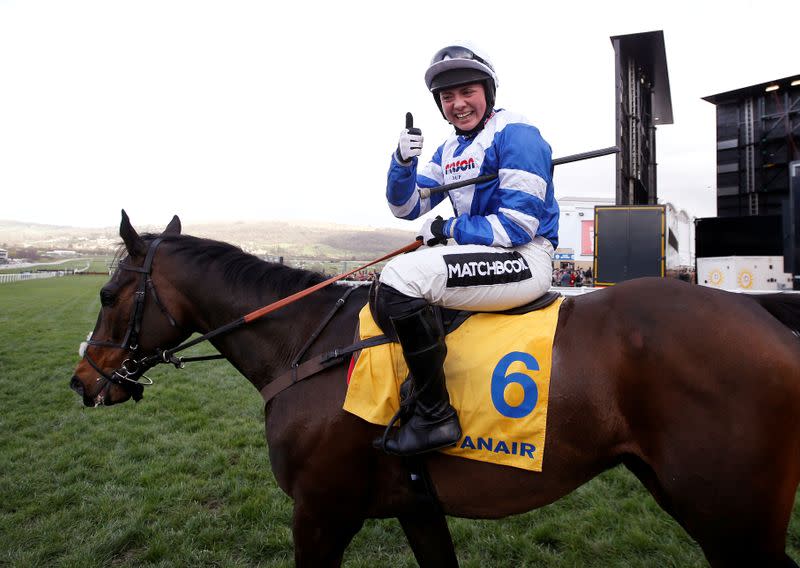Horse racing - Women jockeys shining - when given the chance
By Eleanore Kelly
CHELTENHAM, England (Reuters) - In 1972, Meriel Tufnell became the first female rider in Britain to win an official horse race. It was also the first time female jockeys were allowed to race against men.
In the decades since, success and opportunity have not come easily for women. Yet the recent era has seen a sharp rise in results, prompting women in racing to say "we are not female jockeys we are just jockeys".
The startling increase in race wins over the last few years -- up 76% since 2015 -- has underlined that when it comes to horse racing, it really is a level playing field.
The Magners Cheltenham Festival, which takes place this week, is the Olympics of Jump Racing.
Last year, women outperformed men. Of the 28 winners over the four-day Festival, 14.3% were ridden by women, despite only 9.2% of the rides being taken by women.
Bryony Frost became the first female to win a Grade 1 (top level) race at The Festival. Irish jockey Rachael Blackmore had two wins, to finish sixth place in the prize for leading jockey.
She went on to finish runner-up in the Irish Champion Jockey stakes.
This year Blackmore claimed a decisive win on the first day of The Festival and has a ride in the Cheltenham Gold Cup on Friday.
Appointed as first jockey to trainer Henry de Bromhead, one of the most powerful stables in the entire Jump Racing world, the position is a milestone in itself and could pave the way for more opportunities for women in the sport.
Lizzie Kelly has had two Festival wins in her 10-year career.
"Riding here is how we categorize our success as a rider, having had a festival winner or not," says the 26-year-old who made history as the first woman to win a Grade One Jump race in Britain, when she took the 2015 Novices' Chase at Kempton.
"It's a radical difference from when I began. Women are becoming regular winners and that has normalised it. Having a Champion Trainer in Paul Nicholls using a girl jockey regularly, makes a massive difference," Kelly says.
Success has undoubtedly been helped by prominent trainers such as de Bromhead and Nicholls, giving women more opportunity on better horses.
Nicholls' own daughter Megan Nicholls is a successful Flat Jockey and one of his principal jockeys is Frost.
Frost who rides at The Festival this year, finds the term "female jockey" irritating.
"People have opinions that girls won't be as strong as boys. But it's about technique, balance and mostly it's reading your horses and the race."
In Flat racing last year, Hollie Doyle broke the record for the most wins by a woman in a calendar year (116).
The 23-year-old has never felt undermined by being a woman: "We compete against men every day and we are equals on and off the track. There has been a lot more women competing professionally.
"I think the wider industry has realised that, if given the opportunity, women are just as good as men and our gender should not come into the equation.
"It is important for horse racing and for setting examples in other sports that this is recognised, and we are referred to as jockeys rather than 'female' jockeys."
In order to showcase the talents of women in racing and that all jockeys share the same attributes to be successful, a campaign called #JustJockeys has been launched by Great British Racing.
It urges people to think of riders who happen to be female, as "Just Jockeys".
(Reporting by Eleanore Kelly; Editing by Lisa Shumaker)

 Yahoo Sport
Yahoo Sport 








































